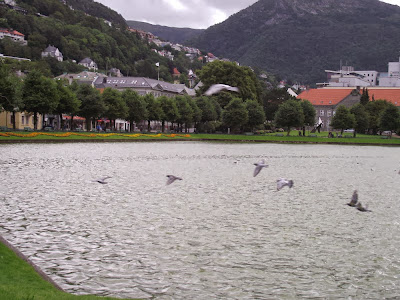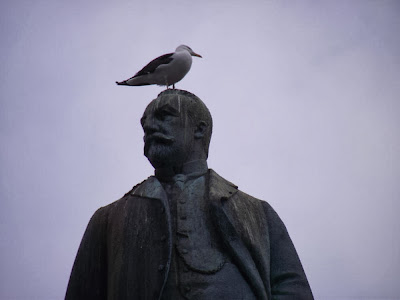Aug 17 - So much to see in Bergen
Bergen is the 2nd largest city in Norway. History shows that Bergen had many fires, but the greatest fire happened in 1702 when 90 percent of the city was burned to ashes. In 1916, 300 buildings burned down in the city centre, and in 1955 parts of
Bryggen burned down. In 1349, the Black Death
was brought to Norway
by the crew of an English ship arriving in Bergen.
The city centre and northern neighbourhoods are located on Byfjorden
and the city is surrounded by mountains. For this reason, Bergen is known as the city of seven mountains.
 |
| "Feed the birds...tuppence a bag." |
 |
| This guy looks VERY grumpy. It's Henrik Ibsen |
|
Henrik Ibsen was a major 19th century Norwegian playwright. He wrote
Peer Gynt and
A Doll's House which became the world's most performed play by the early 20th century.
 |
| Born in 1810, Ole Bull was a composer and virtuoso violinist. |
Ole Bull helped Edvard Grieg with his career.
 |
| One of my favorite composers - Edvard Grieg. |
 |
| Dramatic masks on the Theater building. |
 |
| Playing basketball in the rain. They get used to that as most every day it rains here. |
 |
| A moment of sunshine to get a photo by the pier. |
 |
| Love doing the "selfies." |
 |
| I took this picture to say hi to my niece, Natalie. |
The city of Bergen was founded in 1070. The area of the present
Bryggen constitutes the oldest part of the city. Around 1360 a Kontor of the Hanseatic League
was established there.
As the town developed into an important trading centre, the wharfs were
improved. The buildings of Bryggen were gradually taken over by the
Hanseatic merchants. The warehouses were filled with goods, particularly fish
from northern Norway, and cereal
from Europe.
The following pictures are from the area of
Bryggen. It was very unique, but we didn't get much time to tour around the area.
 |
| "You lookin' at me?" |
 |
| Notice the building behind me - a little crooked and quite crazy. |


St Mary's Church is the only remaining of twelve churches and three
monasteries built in Bergen between its foundation during the reign of
Olav Kyrre (1066–93), traditionally 1070. St Mary's Church was taken over by the city's large German population
in 1408 after which it was popularly called “the German church”
By belonging to the wealthy Germans, St Mary's is richly adorned and
escaped the fate of being turned into a ruin, unlike several of the
other churches in the city.
Not until 1874, long after the German domination in the city had
vanished, did it again become an ordinary parish church, even though
sermons were held in German until after the First World War.
 |
| St. Mary's Church, nearly 1000 years old. |
 |
| Surprise...surprise - another lion |
 |
| These trolls are very happy, aren't they? |
The 700 year-old Fish Market is VERY famous. It was so interesting with all the different kinds of fish and all the ways they cooked them. We didn't buy anything (very expensive), but it sure smelled and looked great.
 |
| The dark meat is whale. |
 |
| Doesn't the salmon look so good? |
 |
| An array of yummy fish |
 |
| Fish paste is a favorite spread on crackers and bread. |
 |
| North Sea Caviar - eewww! NOT for me, but everyone else loves it. |
 |
| OK - this plate is more like it. I'll take it. |
 | |
| These critters are so cute! How can everyone eat them? |
 |
| A popular dish - can't remember the name of it.... |
 |
| Fur for sale |
 |
| Breakfast time -We made puffy pancakes for Tora and kids |
 |
| We had so much fun with them. |
 |
| Memories for a life time - thanks for forgiving me for the egg incident. |








































No comments:
Post a Comment